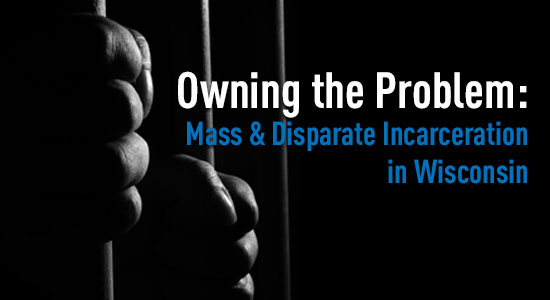More on Discrimination in Sentencing

The Wisconsin Lawyer is publishing a series of articles, “Owning the Problem,” by the State Bar’s Mass & Disparate Incarceration Committee as part of the State Bar’s equal justice initiative to bring stakeholders in the criminal justice system together to address mass and disparate incarceration. Readers continue to provide feedback.
Reader: I’m responding to a letter by Attorney Michael Zaleski who served as a prosecutor for 20 years (Wisconsin Lawyer, July/August, 2018). He objected to the article, “How Did We Get Here? Wisconsin’s Mass and Disparate Incarceration” (Part 1, Wisconsin Lawyer, April 2018), by Shannon Toole and Mary Prosser. According to the former prosecutor, this article falsely gives the impression that there is “gross discrimination” in the Wisconsin court system against minorities. The letter writer states that the impression of gross discrimination was made by using flawed data, and that if all the factors – particularly prior record – are considered, the results would not show gross discrimination.
The two studies of sentencing in Wisconsin, which concluded that black males were sentenced more harshly, both adjusted for prior record. But the conclusion that there is a racist problem in the Wisconsin criminal justice system does not rely alone on data that might be criticized as flawed. Wisconsin is one of the two states in the United States with the highest percentage per population of incarceration of black males. This is not data subject to interpretation. Either Wisconsin’s black males are more criminally inclined than those in Iowa, Minnesota, Indiana, Ohio, all other Midwestern and Western states, and Mississippi, Texas, and so on, or the criminal justice system in Wisconsin is discriminatory.
The premise of the former prosecutor’s letter appears to be that we should only be concerned if there is “gross discrimination.” He appears to be writing that if black males or other minorities in Wisconsin receive only slightly more prison or jail time at sentencing, that is okay.
All discrimination by the police or the courts at sentencing is a violation of equal protection under the law. Any discrimination at all is gross discrimination.
I do not believe discrimination occurs only at sentencing. Wisconsin’s police target minorities. Black comics call one of the minority-targeting techniques “driving while black.” This is common in Wisconsin and is not a joke. There is wide discretion of who is issued a verbal warning and who is searched. If a black driver objects, the driver is given a charge for obstruction even if the driver has done nothing wrong.
Among the statistics presented by Shannon Toole and Mary Prosser is that the black population in Wisconsin’s prisons in the prior few years has been more than half the total prison population. It is currently somewhat less than half. Our state has a population that is less than 20 percent black. How do these statistics make sense without discrimination?
Discrimination based on race is not the only problem in the Wisconsin criminal justice system. In addition, we over-incarcerate.
Nancy Barasch
Kenosha
Reader: Just about every issue of Wisconsin Lawyer these last several months has included an extensive article about the disparity of incarceration rates in Wisconsin’s jails and prisons between blacks and whites. The theme of these articles seems to be that until the black rate is reduced to a rate very similar to the white rate, the Wisconsin criminal justice system is irredeemably unfair and racist. That would be so if the average rate of criminality of blacks in Wisconsin was equal to that of the average of the white population.
You do not need to read Wisconsin newspapers or listen to the local news in Wisconsin for too many weeks before you realize that black criminality in Wisconsin is multiple times greater than the average rate for whites. That glaring reality is apparent in our print and TV news despite the fact that Wisconsin print and TV news organizations tend to go out of their way to downplay black criminality because of the news media’s liberal bias.
It is generally known in the La Crosse County legal community that the judges in La Crosse go out of their way to be fair to criminal defendants of color.
Our police, prosecutors, judges, and correctional institutions should be concerned with individual criminality and not racial groupings.
Harry R. Griswold
Griswold Law Office, West Salem
We Want to Hear from You! Submit a Letter to the Editor
Wisconsin Lawyer provides a forum for members to express ideas, concerns, and opinions on law-related subjects. Send comments to wislawyer@wisbar.org (include “Letters” in the subject line), or mail to Wisconsin Lawyer “Letters,” P.O. Box 7158, Madison, WI 53707-7158. Limit to 500 words. Writing guidelines available.
Connect With Us Online. Post comments to articles
online, and find us on Facebook, Twitter, and LinkedIn.
Point Missing in Rules of Civil Procedure Articles

There’s a major point missing in the articles discussing Act 235 and changes in civil discovery. The Wisconsin Legislature is not “meddling” with the judicial system. It is doing exactly what legislatures do – legislate.
There is much to admire in the general process by which procedural rules are adopted. But, suggesting that legislators and lobbyists are an illegitimate source of changes in procedure is simply too much. Legislators have far more knowledge of the real-world circumstances of the state than do the Judicial Commission or the Wisconsin Supreme Court. Indeed, we want the supreme court to be insulated from politics. But that is a different proposition from insulating policy from politics, the implicit suggestion of Judge Gasiorkiewicz and Attorney Gleissner’s article, “Please, Not So Fast! The Haste to Alter Rules of Civil Procedure” (Wisconsin Lawyer, July/August, 2018).
The legislature has every right to adopt procedural statutes that respond to political pressures. If those statutes are inappropriate, elections will intervene and the statutes will be changed. The Wisconsin Legislature acted to reinstate stronger sanctions for frivolous lawsuits in 2011 (2011 Wis. Act 2). The legislature adopted Act 235 in response to the legislature’s perception that civil discovery can be abused. Legislative findings may or may not be accurate, but in our system of government, they are binding on the courts until changed or found unconstitutional.
Of course we should respect the institutional expertise of the supreme court and its related agencies. But policy is made by the legislature. It is indeed the province of the judiciary to say what the law means, but it is equally emphatically the province of the legislature to make the law.
Mark Hazelbaker
Kasieta Legal Group LLC, Madison
Elements to Succeed on a Fraudulent-transfer Claim

In Beck v. BidRX LLC, 2017AP2043 (Aug. 15, 2018), a three-judge panel for the District II Court of Appeals clarified the elements necessary to succeed on a fraudulent-transfer claim in Wisconsin. The court concluded the judgment creditor in the case failed to prove a transfer was made to an insider for an antecedent debt.
Joe Forward wrote about the decision in “Appeals Court Says Judgment Creditor Did Not Prove Fraudulent Transfer” (WisBar InsideTrack, Aug. 20, 2018). A reader posted a comment.
Reader: The case might be more remarkable for what it did not say than what it did say. Was there no argument or discussion of other statutory sections?
242.04 Transfers fraudulent as to present and future creditors. (1) A transfer made or obligations incurred by a debtor is fraudulent as to a creditor, whether the creditor’s claim arose before or after the transfer was made or the obligation was incurred, if the debtor made the transfer or incurred the obligation: (a) With actual intent to hinder, delay or defraud any creditor of the debtor …
242.05 Transfers fraudulent as to present creditors. (1) A transfer made or obligation incurred by a debtor is fraudulent as to a creditor whose claim arose before the transfer was made or the obligation was incurred if the debtor made the transfer or incurred the obligation without receiving a reasonably equivalent value in exchange for the transfer or obligation and the debtor was insolvent at that time or the debtor became insolvent as a result of the transfer or obligation.
John M. Gallo
Houseman & Feind LLP, Grafton
Expand Use of Commercial Courts

In “The Need for Speed: Commercial Court Open for Business,” Judge Michael Aprahamian discussed the work of a commercial-court pilot project in Waukesha County and several Green Bay-area counties (Wisconsin Lawyer, Jan. 2018). He noted that commercial courts speed up litigation, and cases are decided by judges with ever-increasing expertise in business law.
A reader posted a comment.
Reader: This is a great idea and should be quickly adopted for all districts. However, it should be expanded. For example, these courts should handle business receivership cases, including cases under Wis. Stat. chapter 128. Receivership cases often require expedited decisions in order to ensure the receiver can preserve going concern businesses and maximize return to creditors, yet many judges have little experience to address such issues, resulting in protracted and devastating proceedings.
John M. Wirth
Mallery & Zimmerman SC, Milwaukee
